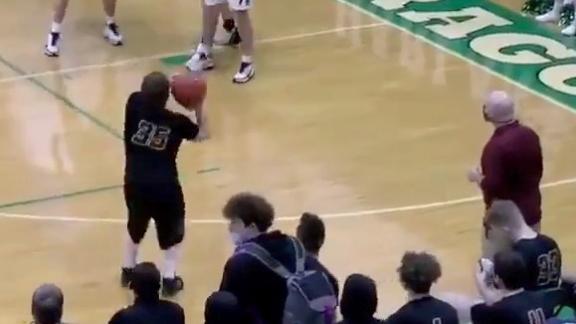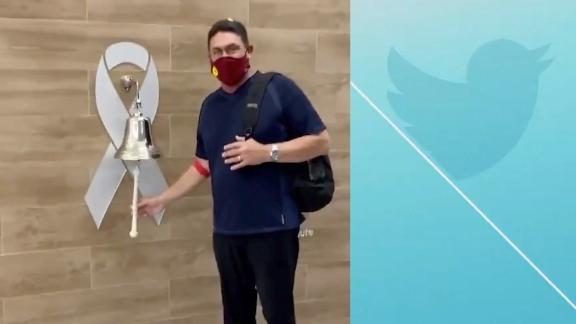What's your motivation?
It's a simple question, and has been since long before Lee Strasberg opened a studio in Greenwich Village and begged Brando to dig deep down to find his.
But the answer is complicated. Money? Pride? Legacy? Family? Fear? Failure? Acceptance? Expectations? Personal glory? Hot chicks? Free beer? Lifetime supply of Tic Tacs? It's deeply personal and often hard for people to admit even to themselves. Just ask someone you work closely with what motivates them and listen to the awkward silence. It's entirely their secret, how they survive occasional indignities.
Now imagine being a bettor, professional or otherwise, trying to handicap in the days and weeks between the end of the regular season and the beginning of the bowl season. There is a season's worth of data available: how teams did on third down, how many yards per play they allowed, how they did on the road in the rain against teams with strong rushing attacks and quarterbacks named Larry.
The sharpest sharps follow 130 college football beat writers on Twitter and spend their days clicking through local papers online. They know what the second-string guard is majoring in and whether his knee is still bothering him from that unfortunate preseason lawnmower incident and if he is having girlfriend problems.
That's because more than any metric, a lot of bettors and bookmakers continue to believe that divining a team's motivation is the key to understanding future performance. Last week, talking to people like Don Best's Todd Fuhrman for my NFL lines column and the Las Vegas Hotel bookmaker Ed Salmons on my podcast, that is all I heard: What are teams playing for? Who are teams playing for?
Understanding motivations
But if it's difficult to understand what truly drives someone who sits next to you every day, imagine how hard it is to get inside the head of a 100 amped-up 18-22-year-olds. To the rational man, it's an exercise in folly. But to the bettor, it's the rip cord in a free fall. "No one thinks a team isn't going to get up for a game," Fuhrman told me. "It's the weeks of preparation leading up to it. How does a team's motivation translate to effort during those practices?"
It gets trickier though. Several subsets of motivation need to be interpreted and then applied to various teams. The first is: How much does this bowl matter to the team that's playing in it?
Take the Duke Blue Devils, for example, playing in their first bowl since 1995. This season, Duke became bowl eligible with a win over North Carolina in October. Then it lost four games in a row to finish the season. It is coach David Cutcliffe's fifth year with the team and his quarterback is Sean Renfree, a redshirt senior who has started for three seasons and been with Cutcliffe during his entire Duke tenure. This moment is something they have been waiting for and working toward together. For recruiting purposes, for the future of a program that really hasn't mattered to anyone outside of the program itself, this game is a defining moment. The motivation is easy to glean.
Years ago Kenny White, who used to run the consulting firm Las Vegas Sports Consultants and is now with Don Best, told me, "I'm more likely to give a team a higher ranking if it hasn't been to a bowl for a while because that will generate excitement amongst the program and fans." The challenge is knowing how to incorporate that value into a more holistic formula.
The flip side of that question is: We're playing in the what bowl? How the hell did that happen? I'm looking at you West Virginia, playing in the New Era Pinstripe Bowl against Syracuse on Dec. 29 at Yankee Stadium (catch it on ESPN!). Remember when the Mountaineers started the season 5-0 and Geno Smith was already being cast in bronze? I know I do. I couldn't help myself from tweeting The Mag story Ryan McGee wrote predicting that exact thing. I didn't tweet so much when WVU went on to lose its next five games and fall out of the rankings. A team that has BCS dreams in October can't be all that thrilled to be playing in someplace that might actually be colder than Morgantown in December.
The third element is: Who are we playing for? Wisconsin has a one-night-only solution for the Rose Bowl, with former coach and current athletic director Barry Alvarez giving himself $225K to fill in for Brett Bielema, who departed for Arkansas.
NC State is playing Vanderbilt in the Music City Bowl, but the man on the Wolfpack sideline won't be longtime coach Tom O'Brien, who was fired after the season. It will be offensive coordinator Dana Bible. Meanwhile, the man replacing O'Brien permanently is Dave Doeren, who led Northern Illinois to a MAC title. Northern presents the opposite side of this motivational conundrum, since it already has a permanent coach in place for its BCS bowl against Florida State, Doeren's offensive coordinator Rod Carey. (It also has the I-can't-believe-we-are-playing-in-a-BCS-bowl motivational factor. It's kind of like "21 Jump Street" crashing the Best Picture race. Great movie, brought a smile to my face, but it doesn't belong in the same category as "Argo.")
All these changes lead to hurt feelings (or a team rallying around the popular assistant), which can affect preparation (positively or negatively), which can mean, well, what exactly?
Every team is a snowflake, every player's motivation is different. Trying to figure it out is the hardest element of handicapping to nail down. But that doesn't mean bettors aren't going to try. And that their opinions will be unshakable.
To start off the bowl season, I asked Fuhrman to give me some breakdowns on five games between now and Dec. 31 that he thought provided bettors with advantages. Here his take:




